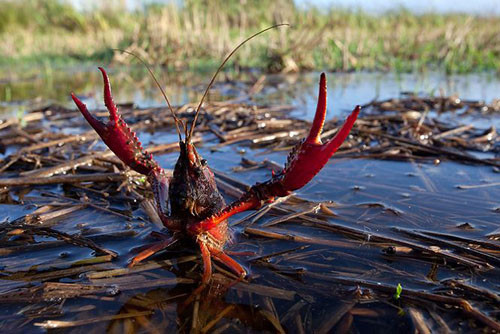Crayfish could become a 'disaster' for Vietnam's agriculture
Crayfish eat all aquatic life, competing with native organisms for food, causing native species of shrimp and fish to disappear.
Crayfish imported from China and the US are being sold widely in Vietnam, with retail prices ranging from 250,000 to 400,000 VND per kilogram, depending on size.
According to Dr. Bui Quang Te, Institute of Aquaculture Research I, crayfish or red lobster (scientific nameCherax quadricarinatus) was experimentally raised in Phu Tho province in 2012. Scientists determined that this is a dangerous alien species so they recommended not to breed it for development.
This shrimp moves quickly at the bottom of ponds, lakes, rivers and streams, likes to dig burrows, has the ability to reproduce quickly and is resistant to environmental fluctuations. With its large, strong red claws, it can cut through hard rice stalks, eat all kinds of young shoots, even shrimp and small fish.
China is currently struggling to deal with the problem of crayfish growing along the Yangtze River. If the species spreads to Vietnamese rice fields, it will be more dangerous than golden apple snails, spreading shrimp fungus and white spot virus, causing heavy damage to shrimp farms, Mr. Te said.
|
Crayfish (Cherax quadricarinatus)is a species prohibited from import into Vietnam. |
Professor Dang Huy Huynh, former Director of the Institute of Ecology and Biological Resources, said that if not prevented in time, crayfish will become a "disaster" for agriculture and the ecosystem.
"They eat all aquatic life, competing for food with native organisms. Typical shrimp and fish species of Vietnam may disappear when crayfish invade," said Professor Huynh.
Crayfish have been included in the list of alien species banned from import and development since 2013. Trading, farming and spreading this species violates the 2018 Law on Biodiversity, said Ms. Hoang Thi Thanh Nhan, Deputy Director of the Department of Nature Conservation and Biodiversity (Ministry of Natural Resources and Environment).
"Controlling crayfish is difficult because they are often imported through unofficial channels. When detecting the trading or farming of this species, people need to immediately report to the nearest commune-level People's Committee to promptly prevent it," Ms. Nhan advised.
The Ministry of Agriculture and Rural Development has sent an urgent dispatch requesting the authorities to strengthen control of crayfish. To protect the environment and avoid negative impacts on agricultural production, the Ministry requested the People's Committees of provinces and cities, the General Department of Customs, and the General Department of Market Management to strengthen inspections and strictly handle violations according to the law.
When detecting releases into the environment, authorities must take measures to isolate and destroy crayfish according to regulations on biodiversity.
Vietnam has many invasive alien species of animals and plants such as mimosa, morning glory, golden apple snail... Their growth rate is very fast, competing with native animals and plants. Vietnamese authorities have tried many methods, but have not been able to eradicate them.
According to Article 246 of the 2015 Penal Code, anyone who imports or distributes invasive alien species will be fined from 100 million to 1 billion VND; sentenced to non-custodial reform for up to 3 years or imprisoned from 1 to 5 years.


